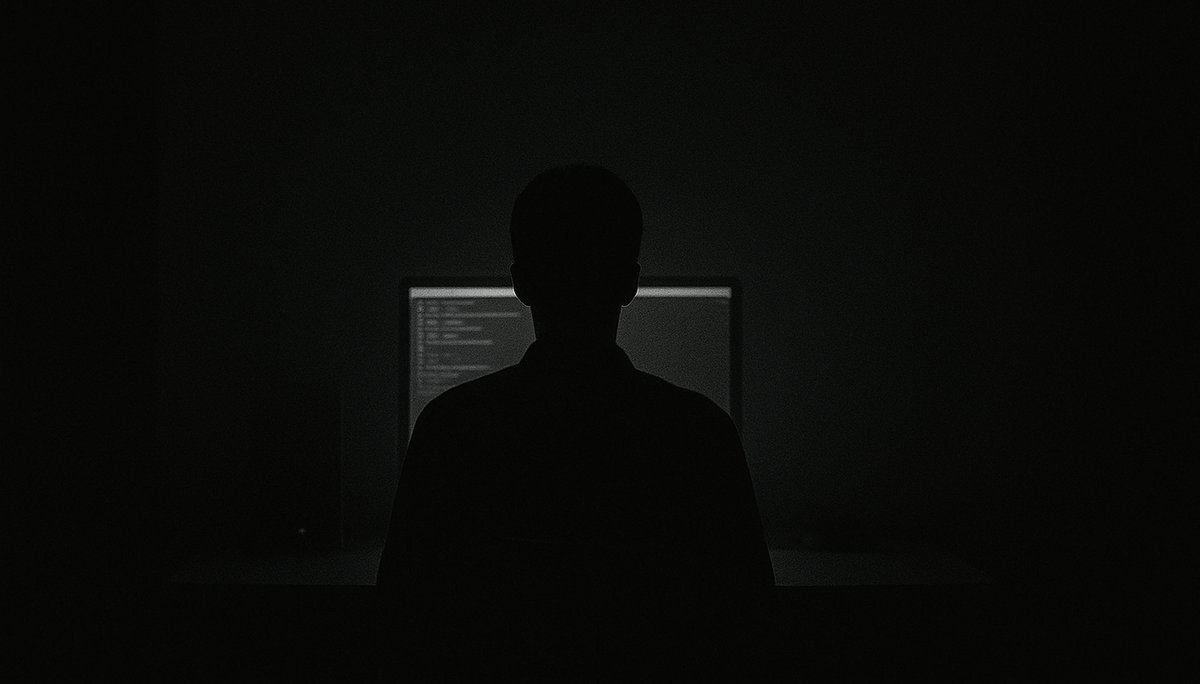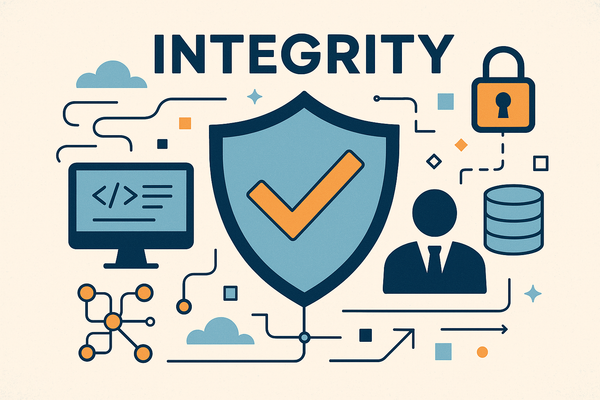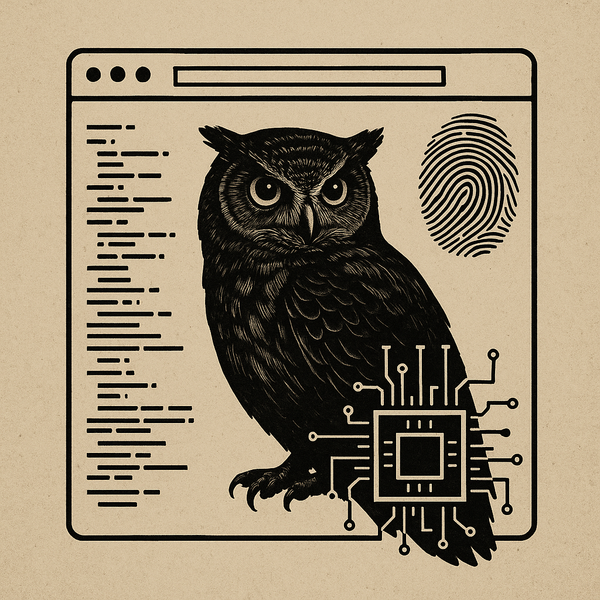Chapter I. Open Session
The tunnel went live at 22:47 GMT. Both endpoints breathing. But no one answered. Days of silence. Then a week. When the reply finally came, five words shattered everything. Later I discovered the truth: my encrypted tunnel didn't save them. It marked them for execution.

(from Letter I. The Aftermath)
They are dead. They are all dead.
The message arrived after a week of static silence from my handler. Seven days where the only sound was the hum of the computers in my room and the echo of unanswered pings. Libya was breaking apart: its long dictatorship collapsing into dust and confusion. For most, it was liberation. For others, it was the beginning of famine, sorrow, and death.
I had been asked to establish secure communication lines for the forgotten, the families hiding in the desert, remnants of the old regime who had vanished beyond the reach of the new order. Landlines still existed, but they were unreliable and slow. Power outages struck without warning, breaking connections and routines alike. Foreign forces had distributed satellite devices to their chosen few, but the rest were left with scraps of technology and the hope that someone, somewhere, could keep them connected.
That someone was me.
I didn’t know who I was helping, and perhaps I didn’t want to. All I needed to believe was that my work mattered, that every restored signal carried a heartbeat back to the surface. I told myself I was helping people survive, one encrypted tunnel at a time.
We built networks in the shadows. Every time one was discovered or destroyed, we started again: searching for friendly hosts, finding providers with weak security, pushing our luck until the next collapse. Each new connection carried not just data, but a fragile pulse of life. That weight drove me deeper into the work. The hours blurred; the tunnels became personal.
Before Libya, there was always another job, another signal to restore, another tunnel to keep alive.We thought of it as maintenance work for a world that refused to stay connected. The faces on the other side of the screen were never visible, just static silhouettes of need. You didn’t ask who they were; you only cared whether the link held. Morality was measured in uptime.
I remember one winter in Belgrade, working twenty-four hours straight to rebuild a collapsed mesh between hospitals. Someone was on location reconnecting cables, tracing physical links through cold corridors, while I reconfigured routers and tested protocols from another country entirely. The request had come through a middleman, volunteer work for a city in need. Later, I learned that part of that same network was used by smugglers moving weapons. Someone asked if I regretted it. I said I didn't know. That was the truth: not knowing became a kind of survival.
We learned to treat neutrality as armor. I told myself that the network didn’t care who used it, that the signal belonged to everyone. But deep down, neutrality was just cowardice dressed as discipline. I was already tired before Libya. Tired of being useful to ghosts, tired of patching systems that only led to new ruins. When that final message came — they are all dead — it didn’t just break a line; it stripped away the illusion that connection meant salvation. Sometimes, all a network does is deliver the news of its own failure.
By then, we had established a couple dozen active links for remote villages and hideouts. I felt pride, real pride, until the last mission came in. A southern settlement, two families isolated from the world. No medicine, no supply lines, four goats barely giving milk. It sounded routine at first.
The tunnel went live at 22:47 GMT, endpoints secured through a VPS in Barcelona, a server I'd rented under a Norwegian passport I no longer had. I monitored it almost hourly, even through the night. The first hour: nothing. I told myself they were setting up, testing the equipment, waiting for darkness. The second hour: still nothing. I refreshed the logs. The connection held. Both endpoints breathing. But no packets, no traffic, no signs of life.
By the third hour I was certain I'd misconfigured something. I traced the route again: Libya → Mediterranean fiber → Spain → encrypted tunnel → their endpoint. Every hop returned. Every checksum matched. The architecture was perfect. So why the silence?
I sent a test packet: a single ping, benign as a heartbeat. It reached the other side in 340 milliseconds. No reply. I sent another. Same result. The system was receiving; someone simply wasn't answering.
At dawn I opened the packet capture and studied the raw traffic. There it was: a single SYN packet at 03:17, half-formed, aborted before the handshake completed. Someone had tried to connect, then stopped. Or been stopped. I told myself it meant they were alive. That they'd attempted contact. That maybe the power had failed, or they'd panicked, or they simply needed more time. I kept the tunnel open and watched the logs scroll: empty line after empty line, each one a breath that never reached the lungs.
Days passed. Then a week. My commands still returned success, the line was alive, yet no one spoke across it. The silence grew heavier each night.
When the reply finally came, I was sitting in my dark room, the glow of another project on the screen. The words appeared like a pulse through the void:
They are dead. They are all dead.
No details. No explanation. Just finality. I wasn’t supposed to ask questions. We were told to move on, to start the next job. But this time felt different. This time, I needed to know.
And so I started digging deeper. What I found in the logs wasn't system failure, it was precision. The tunnel I'd built had been discovered, not by accident, but through pattern analysis. Every encrypted packet I'd sent, every heartbeat ping, had painted a map in the dark. The rebels had monitored the traffic, traced the endpoints, triangulated the settlement. My connection didn't save those families. It marked them. The tunnel that was supposed to be their lifeline became the signal that led to their execution. I had built the infrastructure of their death and called it rescue. The architecture was perfect, I'd told myself while checking the route. And it was. Perfect enough to betray them with millisecond accuracy.
For weeks after that message, I couldn’t touch a terminal. The keyboard felt like a crime scene, every blinking cursor looked like an accusation, every line of code a confession in progress. I left the screens on, though: their faint glow was the only light I could stand.
Sleep came in short, heavy bursts. In dreams I could still hear the desert wind carrying fragments of lost conversations, packets never acknowledged. The mind replays silence differently when it knows what it means.
I began to see networks not as systems but as living organisms, fragile, hungry, always asking for more current, more data, more attention. I realized I had been feeding them pieces of myself for years. When one of those networks died, a part of me died with it.
Eventually, I returned to work, but something fundamental had shifted. I stopped seeing myself as an engineer of signals and began to see the ruins I left behind. From then on, every successful connection felt like an echo of failure deferred. Libya was supposed to be a job. It became a mirror.
Before that day, I had already spent over a decade in the shadows working on systems, breaches, recoveries, and investigations that crossed lines most people never see. I had built reputations under names that weren’t mine and carried secrets that didn’t belong to me. But this was the job that changed everything. This was the moment when the meaning of being a hacker — what it meant to act, to help, to harm — shifted forever.
I write these words now, years later, in a different kind of silence. The machines are quieter, the world louder. For a long time, I believed that forgetting was the same as forgiving. That if I stayed hidden long enough, my ghosts would fade like old code overwritten by new. But the past doesn’t disappear. It lingers in the circuitry of memory: echoing, waiting to be debugged.
I had avoided writing for years. Maybe I feared that memory, once written, stops being memory and becomes evidence. But I owe this to him, and to myself. These letters are an attempt to reconcile two versions of the same person: the one who acted, and the one who now must answer for it.
These are letters to my brother, my twin brother. He never knew this life, the one I hid behind encrypted drives and false trails. I owe him the truth, not because he asked for it, but because he deserves to know who I became. And maybe, through him, I can speak to everyone I’ve kept in the dark: family, friends, partners, people I loved but never fully trusted with the whole of me.
He and I came into this world together, identical twins, and yet we took different paths. He built a life in the light: steady, grounded, open. I drifted into the circuits and frequencies that few others could see. For years I told myself I did it for the challenge, for curiosity, for the pursuit of understanding. Maybe that was true, once. But curiosity is a door that doesn’t close. Every time you open it, you find a deeper room, darker and more compelling than the one before.
At first, hacking felt like an act of discovery, not intrusion. To open a locked door was to reveal how fragile order really was. The world seemed full of systems pretending to be safe, rules pretending to be absolute. To see behind the façade was exhilarating. But each unlocked door led to another decision: to look, to touch, or to walk away. Most of us told ourselves we were explorers, not thieves. The truth, though, is that exploration and trespass are separated only by intention, and intention shifts easily in the quiet of the night.
There were times when I told myself that I was on the side of good, that what I was doing exposed corruption, enabled freedom, connected the disconnected. Other times, I knew I was simply feeding the machine, always someone else’s. Each job had its own justification, its own moral patchwork stitched from half-truths and adrenaline. In those years, I lived in the tension between right and wrong, opportunity and reason, love and hate, greed and survival.
Every system I broke into was a mirror. Some reflected my skill, others my fear. The thrill of access always came with a whisper: Just because you can, does it mean you should? I ignored that voice more often than I’d like to admit. Power is a quiet addiction. It doesn’t shout, it hums, steady and reassuring, until you can’t tell if it’s the machine’s pulse or your own.
That mirror is why these letters exist. I never believed in diaries; too linear, too self-absorbed. Letters, though, are transmissions. They demand direction. They carry intent. You write them for someone specific, even if you know they may never reply. That, to me, feels closer to how a hacker thinks: communication without certainty.
I write to you Brother because you are the one person who still lives entirely outside the noise. Your life moves at human speed, while mine was measured in milliseconds. Maybe these letters are my way of re-synchronizing, of translating the language of machines back into something human. The world measures distance in kilometers; hackers measure it in latency. These pages are my attempt to close the gap.
Each of these letters follows a different current through the same storm. Some will speak of discovery, others of arrogance disguised as curiosity. Some will revisit the people I trusted and the systems that betrayed them. A few may read like technical manuals for regret. Together, they form a map, not of places, but of choices.
This is not a confession, though some pages may sound like one. It’s an exploration of what it means to live with contradictions, to build and destroy in the same breath. These letters are not meant to glorify a past I can’t undo, but to understand it. They are about time: how it passes, how it bends, how it erases and reveals. In the end, every hacker learns that truth has latency; it arrives late, but it arrives.
If this is the beginning, it is not of my story as a hacker, but of my understanding of why I became one.
I write these pages from a place of silence. The screens are dark, the servers in the basement gone. What remains are fragments of people, places, and choices that no longer exist. This is not about guilt or glory. It’s about understanding how a signal sent in good faith can still cause harm, and how even the purest code can carry unintended consequences.
Writing is a kind of reverse engineering. You start with the symptom of the guilt, the silence, the crash, and work backward until you uncover the bug in yourself. Every paragraph is a patch, every admission a line of commented code explaining what went wrong.
Memory resists debugging. It loops, it hides variables, it executes in the background while you pretend to move on. But writing exposes the process. It slows it down until you can finally see the pattern.
If code was once my language of control, writing has become my syntax for surrender.
Maybe, by sending these letters into the world, I am trying to build one last connection: an invisible tunnel from what was to what still can be.
If you are reading this, brother, then the line is still alive.
from Letter I. The Aftermath.
Next chapter will be published next week.



